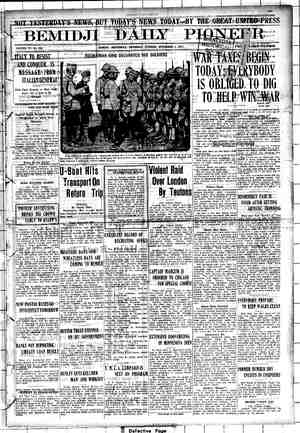The Nonpartisan Leader Newspaper, November 1, 1917, Page 3
You have reached the hourly page view limit. Unlock higher limit to our entire archive!
Subscribers enjoy higher page view limit, downloads, and exclusive features.
o g VOL. 5, NO. 18 5 In‘ the interest of asquare deal for the farmers Tlonnartisan Teader A magazine that dares to print the truth Official Magazine of the National Nonpartisan League HE Press of the country, as you know, has been trying to con- vince the people that the Nonpartisan league, the great farmers’ political and economic movement, is ‘‘pro-German’’ and ‘‘dis- loyal’”’. Morris in this cartoon shows why the Kept Press pretends to take this view of the Lieague. The Kept Press is the stenographer of Big Business and writes as her employer, to whom- she has sold her _ virtue, dictates. This cartoon is a powerful indictment of the press of the United States. Morris has brought out the idea as few cartoonists could have done it. : At the present time, Theodore Roosevelt, who has been making nasty attacks on President Wilson, denouncing him for a}legefi “mud- dling’’ of the war and for ‘‘proomstick’’ preparedness, is being used by the Big Business press to besmirch the League and its members. We call attention to one of Teddy’s recent editorials, appearing on the " editorial page of this issue. Read it. FARGO, NORTH DAKOTA, THURSDAY, NOVEMBER 1, 1917. WHOLE NUMBER 111 i BIG BUSINESS AND HIS STENOGRAPHER ' Z AT ML ) “‘-“ \ I.‘l’. The Big Business press uses any individual it can in its fight on progressive political movements of the common people. It hires clever editors who frankly sell their ability to betray the people. It uses dis- credited politicians who have a grouch to satisfy and who like ihe pub- licity the Kept Press gives them when they attack people’s movements for economic justice. Most of all the Kept Press likes to use in iis campaign against popular democratic movements persons who &t oxe time or another have been, or have seemed to be, on the side of the people, but who have sold out, or become rich and reactionary, or whe have personal prejudices to satisfy. The use of these at-one-time, has- been progressives, or near progressives, or men who have pretended ts be progressive, ‘‘takes the cuss’’ off the campaign of the press against the people—lends weight to the side of monopoly, autocracy and op pression. Beware of pretended progressives who attack real deraoera- tic political and economic organizations. - PAGE THREE 'y i g






